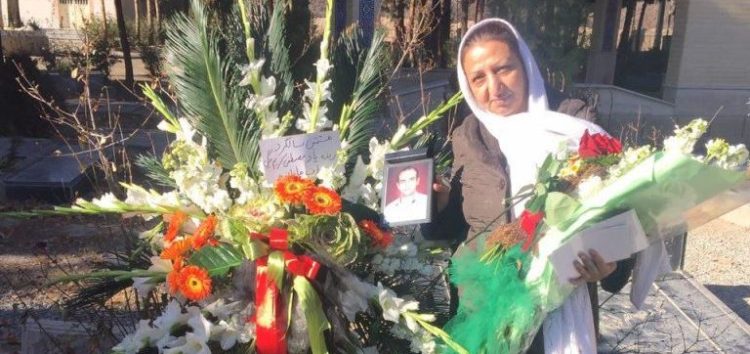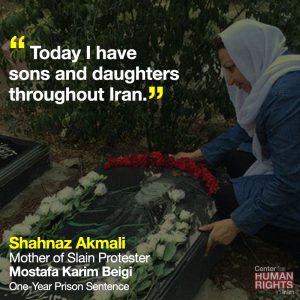“Today I Have Sons and Daughters Throughout Iran,” Says Slain Protester’s Mother Sentenced to Prison
 Shahnaz Akmali Summoned to Jail After Visiting Fellow Victim’s Family
Shahnaz Akmali Summoned to Jail After Visiting Fellow Victim’s Family
Less than a month after hundreds of people were killed in the Iranian authorities’ crackdown on November’s mass street protests, a court in Tehran summoned the mother of a victim killed in a 2009 crackdown to prison for demanding justice.
The Center for Human Rights in Iran (CHRI) learned that Shahnaz Akmali was summoned to prison after she visited the family of a protester who died from a gunshot wound in the city of Karaj, west of the capital, on November 16, 2019.
“After the deaths of protesters in November, Akmali visited Pouya Bakhtiari’s family [in Karaj, west of the capital],” a source with detailed knowledge of Akmali’s case told CHRI on condition of anonymity to protect their security.
“That’s what the regime is fearful of: solidarity among grief-stricken mothers. That’s why they immediately summoned Akmali to service her prison term,” added the source.
Akmali was ordered to report to Evin Prison in Tehran in early December 2019 to begin serving a one-year sentence for seeking justice for her son Mostafa Karim Beigi, who was shot and killed in Tehran during a 2009 protest.
“The summons that I received says the legal deadline is five days,” she tweeted on December 5, 2019, with a copy of the summons.
“When I was being interrogated, they told me to forget I ever had a son,” she added. “I said I can’t forget. So this is the punishment for a mother who cannot forget she once had a son.”
 Referring to the 208 people who died between November 15, 2019, and December 2 as authorities used lethal force to repress protests that broke out in dozens of Iranian cities in response to a sudden fuel price hike, Akmali added, “Today I have sons and daughters throughout Iran.”
Referring to the 208 people who died between November 15, 2019, and December 2 as authorities used lethal force to repress protests that broke out in dozens of Iranian cities in response to a sudden fuel price hike, Akmali added, “Today I have sons and daughters throughout Iran.”
In late September 2019, the Appeals Court in Tehran upheld a one-year prison sentence against Akmali as well as a one-year ban on her travel and social media activities after convicting her of “propaganda against the state.”
The conviction was based on Akmali’s peaceful activism centered around demanding justice for her son and other victims of state violence.
Akmali had been arrested in January 2017 for allegedly organizing activities for a group called the Mothers of Laleh Park, which advocates for victims of state violence before ultimately being prosecuted on the charge.
“The Karim Beigi family have been living under a lot of pressure and threats for many years,” a source told CHRI. “Mostafa’s mother has been detained and her husband and daughter have been initiated many times, but she never stopped carrying the flag of justice,” the source added.
The young man whose family Akmali visited, Pouya Bakhtiari, was killed when he stopped his car in the middle of the street to join a protest in November 2019. His mother, Nahid Shirpisheh, was with him on the day of his death.
“My purpose in going on with life is to find my son’s killers,” Shirpisheh told CHRI. “Then I want to see the punishment of the person who ordered the killing of Pouya and other Pouyas in such an atrocious manner. I want to witness and celebrate the freedom of the people of Iran.”
After visiting the Bakhtiari family, Akmali tweeted, “When I was with Pouya’s mother, my wounds resurfaced. It was as if it was only yesterday when I was kissing my son’s lifeless body.”
She continued: “I went to visit Pouya’s mother in order to let the authorities know that the flag of justice has been passed on from the mothers [of thousands of political prisoners buried] in Khavaran [Cemetery south of Tehran] 40 years ago to the mothers of [victims in] 2019.”
Parastou Forouhar, an artist and human rights activist whose parents were killed by Intelligence Ministry agents in 1998, retweeted Akmali’s announcement about being summoned to prison and wrote, “What crime has Shahnaz Akmali committed? Her crime is being a mother! Her crime is seeking justice for her son! Her crime is showing sympathy for grief-stricken families!”
Akmali’s daughter, Maryam Karim Beigi, tweeted, “Your Islamic mercy reached us with bullets and summons and detentions.”
She was referring to an order by Iran’s Supreme Leader Ali Khamenei on December 4 declaring that “ordinary citizens with no role in the recent protests and riots who died in the clashes” should be treated as “martyrs,” a term that is technically supposed to be given to people who voluntarily died for a cause.
Read this article in Persian.






